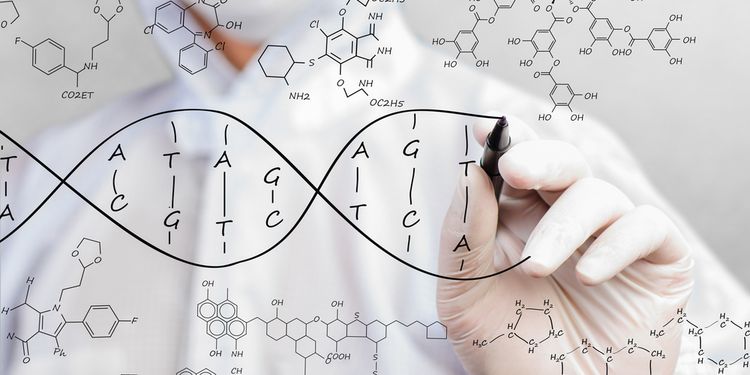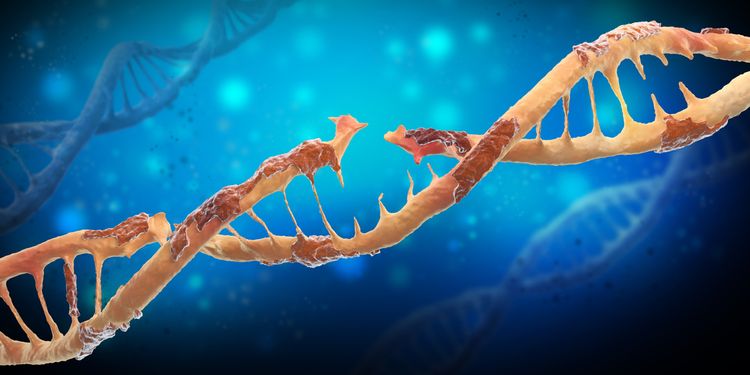Genetics Explained in Plain English

If you’re like most people, you hear the word “genetics” all the time in the media, but have you ever had it explained to you in a way that makes sense? If the way genetics is talked about leaves you scratching your head and wondering what it all really means, then it’s time to gain a whole new understanding of your genes and why they matter.
Genetics is about your inheritance— not the money or property left to you by relatives, but the biological information passed on to you from your parents that influences how your body develops and functions.
What Are My Genes?
The biological information passed down to you from your parents is carried in molecules called DNA. There are specific sections on those DNA molecules called genes. Humans have around 20,000 genes that influence a wide array of biological traits and functions in the body.

Here’s one way to think about your genes: they’re like computer software. For the hardware of a computer to actually do anything for you, a computer program has to be written that tells the computer what to do.
The same is true of the human body, and your genes are the “software” that tells your body how to function. Your genetic software was “written” by your parents and passed on to you. In other words, you inherited your biological software from your parents.
What Do My Genes Do?
What genes actually do is make proteins, which are the building blocks of all life. Your genes tell all the cells in your body what to do and not do by making the 100,000 or so proteins in your body that make your body work and do different things.

The way this happens is interesting. Enzymes “read” the instructions coded in your DNA’s genes in the nucleus, which is like the “brain” of a cell, and then transcribe that into “messenger” RNA (mRNA) that travels out of the nucleus into the cell’s main area. Then the cell’s little protein factories (ribosomes) “read” the “recipe” carried by the mRNA and make the specified proteins.
Quick recap: DNA is used to make RNA, and RNA is used to make proteins because proteins run the whole show in the human body.
Sometimes, however, your genes aren’t quite right. You can inherit problems with genes, where some might be missing or might be malformed so that they can’t do what they’re supposed to do. The result can be any number of diseases and health issues.
A good example is hemoglobin— a very important protein that helps red blood cells carry oxygen all through your body. If you inherit a gene for making hemoglobin that doesn’t have the right recipe, you might have inherited anemia, which means not having enough working red blood cells.
Genes can also change (or mutate) in ways that make them malfunction. Gene mutations may play a role in all kinds of diseases, including cancer.

Can I Change My Genes?
This is where you hear about what people call the “nature versus nurture” debate. The question is this: how much of who you are (in terms of health) is inherited and how much comes from the environment, meaning how you decide to live your life and what kinds of things you’re exposed to? To better understand this, take obesity and diabetes as examples.
It’s true that the genes you inherit can make you more likely to become overweight or obese, and that may put you at a greater risk of developing type 2 diabetes. When you inherit genes that make any particular health outcome more likely, it’s called a genetic predisposition— you’re “predisposed” to develop a health condition because of the genes you inherited from your parents.
About 70% of all people inherit genes that make them more likely to be carbohydrate intolerant and insulin resistant, which sets the stage for becoming overweight or obese. And if type 2 diabetes also runs in the family, many people are genetically predisposed to become overweight and diabetic.
But here’s the good news, as some doctors put it: “Predisposition is not pre-destiny.” Just because you’re genetically predisposed to develop a condition doesn’t mean you have to accept it as an unavoidable destiny. This is when we get back to the nature vs. nurture debate.

You see, it’s not an either/or choice between one or the other, it’s very much a both/and situation. Here’s a good way to think about it: genetics (nature) may load the gun, but it’s environment (nurture) that pulls the trigger.
If you inherit genes that make you carbohydrate intolerant, even small amounts of sugar and starch make your body create way more insulin than other people, which makes you gain weight and can eventually lead to obesity and type 2 diabetes (not to mention high blood pressure and heart disease).
The trick for these people is to watch what they eat and get plenty of regular exercise. In other words, they can work around their genetic predisposition by changing what they do in their environment.
As you might have guessed, for people who are genetically predisposed to obesity and diabetes, the modern American diet heavy on sugars and carbohydrates serves to pull the trigger and cause the undesired health outcomes.
Any time you discover that you’re genetically predisposed to develop any kind of disease or health condition, it’s important for you to be proactive in determining what lifestyle changes and choices you can make that help you avoid that negative health outcome. The answer is almost always about making better choices around what you eat, getting enough exercise, getting enough sleep, and reducing stress in your life.

Do I Need to Know My Genes?
Life in the 21st century has some real advantages when it comes to genetics. You can have your genes tested to find out if you’re predisposed to various diseases and conditions. This is especially important for couples hoping to have children. After all, wouldn’t you want to know ahead of time that you might pass on a serious disease or condition to your child?
If you want to do this before you conceive, you would look to get “carrier testing”— genetic testing that tells you if you’re a “carrier” of genes that can cause diseases. You would especially want to do this if you know there’s a family history of inherited diseases. Once a woman is pregnant, the fetus can be tested to see if it has already developed a disease. Newborns can also be tested.
For yourself, if you know you’re genetically predisposed to cancer or other diseases, you can start making better lifestyle choices right away that will keep that genetic predisposition from becoming a reality. If you want that kind of knowledge, then you would look for what is called a predictive and pre-symptomatic genetic test.

Summary
Your genes have a lot to say about who you are, and everyone’s genetic structure is what makes them unique and special. But your genes can also predispose you to all kinds of unpleasant diseases and conditions, which is why genetic testing is a good idea.
Knowledge is power, and you have the power to make choices that avoid negative health outcomes even if your genes seem to be pushing you in that direction. You can overcome most genetic predispositions by making healthy lifestyle choices.
